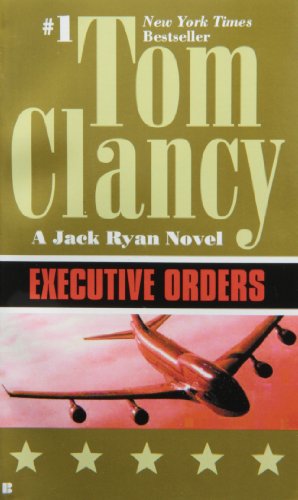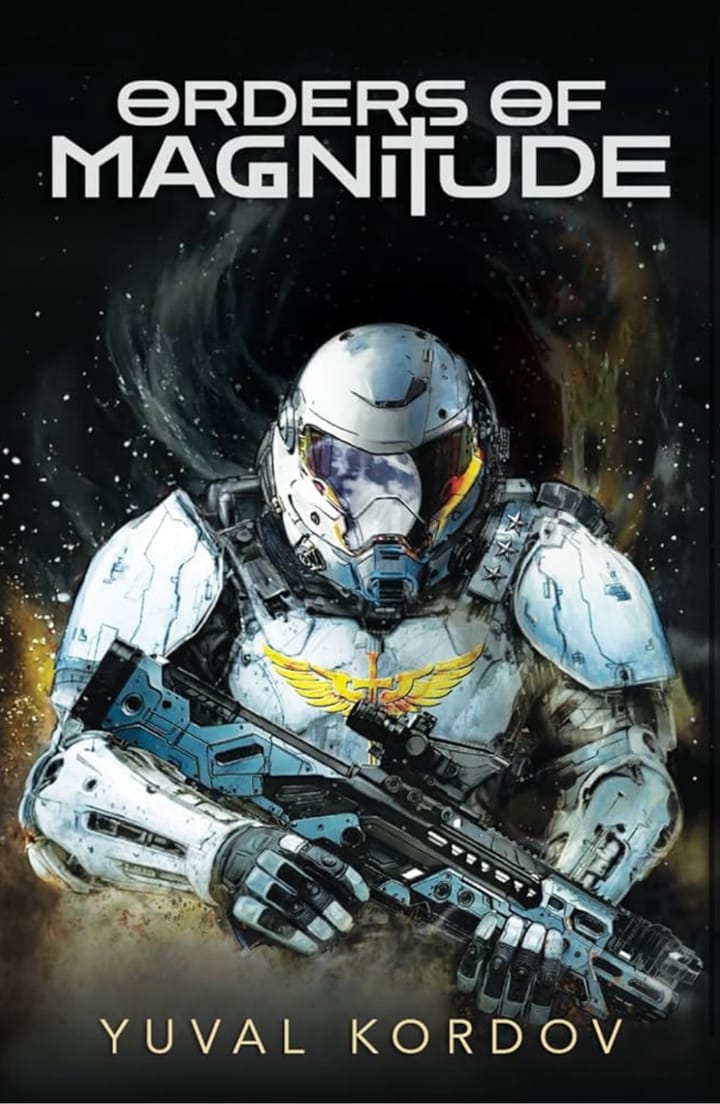The Long View: Executive Orders

Tom Clancy
Here is a link to the Oliver Stone review of Executive Orders that motivated John to read the book. I find the Stone review kind of funny, especially this:
As usual, some of the Clancy plotting is fiendishly inventive, and he has a technically sharp command of the realistic detail, like the horrifying use of Ebola as an instrument of war rather than of nature. But the realism comes at the expense of the story's flow, and here I must ask whether anyone actually ''edits'' Mr. Clancy, or for that matter whether there is any living workaholic who actually reads every cybernetic paragraph, with its obligatory expressions of grief, anger, fear and that little bit of love that in Mr. Clancy's world can be taken to mean ''responsibility.''
This is actually my primary complaint about Tom Clancy novels: he got too rich and too famous to edit. For Clancy himself, this was forgivable, at least in my eyes. I tried reading one of the sequels penned after his death. It was as long as any Jack Ryan tale, but it lacked Clancy's spirit. Ah well.
Tom Clancy was massively popular, the LA Times estimated that more than 100 million books he authored were in print at the time of his death. John's review tells us part of the reason why:
The fact is that Executive Orders really is not a techno-shot-’em-up at all. It is a novel of ideas. Some of them are naive ideas. Some of them are bad ideas. Many of them are commonplaces. Nevertheless, Executive Orders does ask questions that ought to be part of the political landscape in the United States but are not. Someone as variously well-informed as Tom Clancy would no doubt be offended if he were told that his writings were examples of the popular mind at work. However, it might be just to say that this book is a fair sample of the educated but non-elite mind of America. It is neither ignorant nor unperceptive, and it is reaching conclusions quite different from those enunciated by people who claim to speak for it.
This constituency is now probably going to vote for Trump, after being pointedly ignored for the last twenty years.
Executive Orders
by Tom Clancy
G.P. Putnam’s Sons, 1996
$27.95, 874 pp.
ISBN: 0-399-14218-5
A Thought Experiment
Oliver Stone persuaded me to read this book. I had never read a Tom Clancy novel before. I had heard of them, of course. They were all, obviously, very big, and I had the impression that they dealt mostly with the design specifications of lethal instruments. Neither of these are qualities that normally engage my interest. Oliver Stone’s review of Executive Orders in The New York Times of September 22, however, suggested to me that there might be something special about this book. Stone patronized Clancy’s reactionary political opinions and the obdurate adherence by Clancy’s main character to Catholicism of the most obscurantist sort. He made light of the international perils that Clancy described as slightly paranoid plot conventions. Finally, he explained Clancy’s world view in Jungian terms: by describing an America beset by foreign enemies against which his heroes had to defend her, Clancy was really describing his own attempts to come to terms with his feminine “other.” The implication was that dramatic fiction of this sort was no longer appropriate to a matriarchal era, when we can approach our feminine selves in more direct and conscious ways. Since I was unable to strangle Mr. Stone after reading his review, I decided that the least I could do was read the book as an act of solidarity with the non-airheads of the world.
Not being a regular Clancy reader, I cannot say precisely how this work differs from his earlier books. However, I am reliably informed that this one is far more political and even chatty than his usual efforts. There cannot be more than 150 pages of actual combat, terrorist raids and assassination attempts, apparently a small percentage for a Clancy book. Furthermore, though we have one major and one minor international conflict depicted here, the book’s focus is more on the sorry state of American domestic politics than is usually the case.
The book, in fact, is an unsubtle thought experiment. In the opening pages, we have Jack Ryan, the CIA agent-history professor-former Marine long familiar to Clancy’s readers, looking with great dismay at the burning wreck of the Capitol building. It seems an irate Japanese pilot from the last novel had just crashed a commercial airliner into the building during a joint session of Congress, thereby killing the president, most members of both Houses, the entire Supreme Court and pretty much the whole cabinet. Ryan’s particular problem was that the joint session in question had just elected him vice president so that he could serve out the term of the previous incumbent, who had been forced to resign for conduct unbecoming a goat. The appointment was intended as a pro-forma honor for Ryan’s many services to the Republic. Unfortunately for him, once the president and Congress were blown to cinders, he became a president without a government, or even a party. His mission this time is to rebuild the federal government of the United States from the ground up to a degree unprecedented for any president since Washington. This is a premise to give one pause.
In many ways, Executive Orders was a pleasant surprise. I had read some techno-shoot-’em-ups by other authors, and they were conspicuous for the wooden quality of their characters and the didactic improbability of their dialogue. No one is ever going to confuse Clancy with Dickens, but Clancy’s characters do look a bit like people, certainly enough to excite the sympathy or antipathy of the reader. Some of them even develop in the course of the story. Also, Clancy seems to have a gift for imagining villainies truly villainous. For instance, the way in which the forces of evil collect Ebola virus for a germ warfare attack on the United States is so breathtakingly wicked that only the reticence customary in reviewing novels of intrigue inhibits me from sharing the procedure with you now. (Oh, what the hell: The Iranians kidnap an elderly nun infected with the virus from West Africa and take her to a secret laboratory on the outskirts of Tehran. There they deny her pain medication so as to prolong her life as she melts into a puddle of infectious material. The bastards!) The chief stylistic drawback to the book is that this novel alone is longer than the entire literatures of certain minor languages. Also, though you cannot always have everything, when you do it might be a good idea to have it in larger print.
The fact is that Executive Orders really is not a techno-shot-’em-up at all. It is a novel of ideas. Some of them are naive ideas. Some of them are bad ideas. Many of them are commonplaces. Nevertheless, Executive Orders does ask questions that ought to be part of the political landscape in the United States but are not. Someone as variously well-informed as Tom Clancy would no doubt be offended if he were told that his writings were examples of the popular mind at work. However, it might be just to say that this book is a fair sample of the educated but non-elite mind of America. It is neither ignorant nor unperceptive, and it is reaching conclusions quite different from those enunciated by people who claim to speak for it.
For one thing, Clancy understands the shape of the world. The international element in this book is provided by a conspiracy in which the Chinese instigate a crisis with Taiwan just serious enough to draw American forces out of the Indian Ocean while the Iranians are up to no good on the other side of Asia. While the particular scenario Clancy paints is no more probable than any other, the basic configuration of simultaneous threats of both sides of Eurasia is the primary fact of life for the United States today. There is no escaping the reality that US security is threatened if something goes seriously wrong in Europe, the Middle East or East Asia. The worldwide military capability that the US developed during the Cold War is a permanent fact of life, because there is no alternative to a US military that is capable of fighting two major wars at once.
The most informative technically oriented passages of the book deal with the Iranian germ-warfare attack on the United States itself. Clancy is to be forgiven for presenting us with one more rendition of the ghastly effects of the Ebola virus (an innocent nun, the absolute bastards!), and he does in fact perform some service by demoting this and other superdiseases from the status of apocalyptic agents to just more nasty bugs. Unlike what films like “The Hot Zone” would have you believe, epidemics really do not spread all over the world like a quart of fuel oil spilled on a map. Diseases that are both highly contagious and rapidly fatal also usually burn themselves out quickly. Most serious infections, including Ebola and AIDS, actually are not highly contagious at all, and can be controlled through their means of transmission. That is why germ warfare is really a terror weapon.
The constitutional crisis that Clancy describes arising from the president’s restriction of the right to travel is chimerical, however. The police powers of government in times of emergency have very few restrictions, and certainly closing down the airports and highways would be well within them. One minor disappointment to me, in fact, was how little use Clancy makes of the “executive orders” of the title. I once worked for the publishing company that has the contract to codify federal law, and one of the things I did was figure out where permanent presidential executive orders would go in the United States Code. I was astonished at just how much of the administrative activity of the federal government is governed by this kind of “legislation,” some of it based on rather general but perfectly valid statutory authority. The practical reach of this authority would of course be much greater if Congress were not around to object.
Not all of Clancy’s ideas are happy. The notion of staffing the CIA with former policemen instead of drunken fraternity brothers is misguided. Spies are not cops, just as cops are not soldiers. Spies, or at least the agents who control them, are essentially social workers: they keep track of disgruntled people and give them money to keep them cooperative. Cops can be taught to do this, of course, but there is no reason to think they would be especially good at it.
President Ryan’s ideas about the domestic reform of the federal government are expounded at great length, often in interviews with untrustworthy journalists, but there are few specifics. He wants budgets balanced. He wants taxes flat. He wants useless bureaucrats cleaned out of the departments. He also wants all of this done yesterday, which maybe you could do with Congress blown up, but I would not bet on it. In any event, this agenda misses the point. The United States is not overburdened with hordes of pestilential bureaucrats. Rather the opposite: when the government malfunctions, it is usually because the staffs are too small to carry out the duties Congress assigned. If you have ever had trouble with the IRS, for instance, you know that half the problem is getting some harassed officer worker to look at your file for a full ten minutes. The rising cost of government is purely a function of the growth of entitlements. What the federal government mostly does is write checks and send them to people who are sick or old or disabled. Balancing the budget means writing smaller checks or collecting more tax money. It is as simple as that.
One luminously sensible domestic position that Ryan takes has almost disappeared from American political discourse. He will enforce existing laws regarding abortion. However, he opposes abortion, not just personally but as a matter of public policy, and he believes that the Supreme Court decisions on this matter are wrong because the Constitution simply does not address the issue. He will seek to have those decisions overturned by appointing judges who believe likewise. Once the Supreme Court gets it right, the whole subject would then be de-constitutionalized and de-federalized. No phony support for a constitutional amendment, and no pretense of agonized neutrality. This is a winning formula, one that is neglected by allegedly “pro-life” politicians who are perhaps less eager to actually change the law than they would have us believe.
In some ways, the book is most interesting for the ideas that should be there but still are missing. There is little sense here of government as a positive good. This is not to suggest that the service of the state is the goal of life. The state is not even the master of civil society. However, in the Thomistic political theory espoused by the Catholic Church even today, politics is a worthy enterprise in its own sphere, just as art and science are in theirs. It is the means by which we achieve those goods that we cannot achieve as private persons. The people who make a career of conducting government should not be assumed to be tyrants or crooks waiting for the citizenry to relax their guard so they can steal the treasury. They do not deserve to be blown up by a Japanese airliner, nor do they need to be for government to work effectively. Clancy seems to be a visceral Catholic. This means, among other things, that he understands that authority is a necessary element in human life. It also means that he can distinguish legitimate authority from authoritarianism. What he lacks, because the general culture still lacks it, is a developed sense of how the state can be more than a mere utility.
You should not read too much into popular novels, especially not into popular novels by one author. Nevertheless, the very fact that a successful novelist thought his readers would be interested in the sort of examination of the political system Clancy presents here does show that a lot of things that formerly were taken for granted are now open to question. If Clancy’s feel for his readership is right, they do not want a revolution, Republican or otherwise. They don’t want a dictator, and they don’t want a country that is run like an army. What they do want is a change of regime, something far deeper than a change of parties. To paraphrase Justice Anthony Scalia, they want a government suited to a country they can recognize.
Well, at the end of the novel President Ryan was announcing his bid for reelection. No doubt he will have an eventful second term.
This article originally appeared in the December 1996 issue of Culture Wars magazine.
Copyright © 1996 by John J. Reilly

Executive Orders (A Jack Ryan Novel) By Tom Clancy



Comments ()